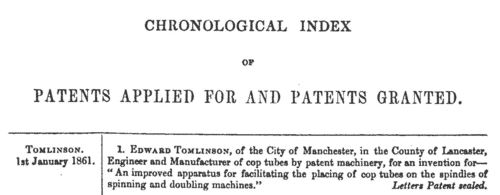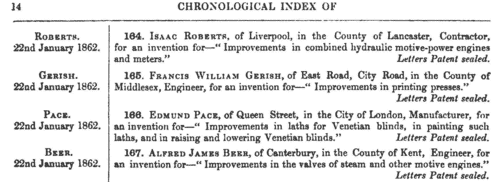Prisoners removed from Millbank Prison to the Justitia hulk
(1843-1846)
The new prison at Millbank was used as a holding centre for convicts destined for the hulks: 'few of the adult convicts remain for a longer period than three months; and of those who remain for a longer period, the most part are criminals of the worst description, who are awaiting embarkation for their final destination in Norfolk Island.' The report of the commissioners appointed to inquire into the management of the prison includes a return of male convicts transferred from the Millbank Prison to the Justitia hulk, from 1 August 1843 to 21 June 1846, giving: Register Number; Name; Number of Reports for Misconduct; Punishment; How long in this prison.
PARFREY. Cost: £6.00.  | Sample scan, click to enlarge

|
Patentees of New Inventions
(1852-1853)
Abstracts of British patents for new inventions applied for and granted from 1 October 1852 to 31 December 1853: giving date, name and address, and short description of the invention. It is then stated whether 'Letters patent sealed' or 'Provisional protection only'.PARFREY. Cost: £6.00.  | Sample scan, click to enlarge

|
Traders and professionals in London
(1856)
The Post Office London Directory for 1856 includes this 'Commercial and Professional Directory', recording over 100,000 individuals. PARFREY. Cost: £4.00.  | Sample scan, click to enlarge

|
Petitioning Creditors and Solicitors
(1857)
Principal creditors petitioning to force a bankruptcy (but often close relatives of the bankrupt helping to protect his assets): and solicitorsPARFREY. Cost: £6.00.  | Sample scan, click to enlarge

|
Long-stay Paupers in Workhouses: Stow (Suffolk)
(1861)
This comprehensive return by the Poor Law Board for England and Wales in July 1861 revealed that of the 67,800 paupers aged 16 or over, exclusive of vagrants, then in the Board's workhouses, 14,216 (6,569 men, 7,647 women) had been inmates for a continuous period of five years and upwards. The return lists all these long-stay inmates from each of the 626 workhouses that had been existence for five years and more, giving full name; the amount of time that each had been in the workhouse (years and months); the reason assigned why the pauper in each case was unable to sustain himself or herself; and whether or not the pauper had been brought up in a district or workhouse school (very few had). The commonest reasons given for this long stay in the workhouse were: old age and infirm (3,331); infirm (2,565); idiot (1,565); weak mind (1,026); imbecile (997); and illness (493). PARFREY. Cost: £6.00.  | Sample scan, click to enlarge

|
Patentees of New Inventions
(1861)
Abstracts of British patents for new inventions applied for and granted from 1 January to 31 December 1861: giving date, name and address, and short description of the invention. It is then stated whether 'Letters patent sealed' or 'Provisional protection only'.PARFREY. Cost: £6.00.  | Sample scan, click to enlarge

|
Patentees of New Inventions
(1862)
Abstracts of British patents for new inventions applied for and granted from 1 January to 31 December 1862: giving date, name and address, and short description of the invention. It is then stated whether 'Letters patent sealed' or 'Provisional protection only'.PARFREY. Cost: £6.00.  | Sample scan, click to enlarge

|
Patentees of New Inventions
(1864)
Abstracts of British patents for new inventions applied for and granted from 1 January to 31 December 1864: giving date, name and address, and short description of the invention. It is then stated whether 'Letters patent sealed' or 'Provisional protection only'.PARFREY. Cost: £6.00.  | Sample scan, click to enlarge

|
Research your ancestry, family history, genealogy and one-name study by direct access to original records and archives indexed by surname.










